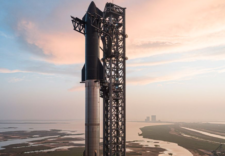[NB: check the byline, thanks. /~Rayne]
I’m on the verge of blocking every occurrence of the name “Elon Musk” from my Twitter timeline because I have fucking had enough of him.
Never mind all his idiotic uninformed and uneducated prattle about free speech. He obviously can’t be bothered to read the 45 words which are the U.S. Constitution’s First Amendment.
Nor can he be arsed to read the Constitution’s Article I, Section 8 regarding the regulation of commerce.
He also can’t be bothered to grasp what it means to “practice medicine without a license,” thereby exposing many more layers of laziness.
Spreading medical bullshit as unlicensed medical practice is regulated to prevent bellends killing or maiming or sickening people.
The worst part of all the Muskian bullshit is that Musk has enough assets not to care. He can throw lawyers at whatever problem confronts him to make it disappear and continue on his Muskian way. He can indulge his shallowness and narcissism with impunity, having ample fanboi trolls to dispatch at anyone who questions his motives or actions.
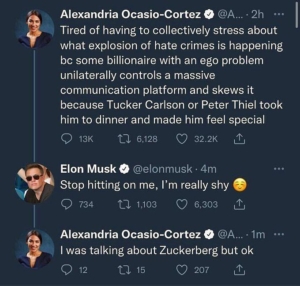
Muskian narcissism, bordering on Trumpian malignant narcissism, caring only about his own goals and not at all about anyone else though his personal value is completely reliant on others.
Insert Seinfeld meme here, “You know, we’re living in a society.”
It’s not merely a meme; it’s the crux of the problem before us, whether we live in a democratic society in which free speech and the rights of individuals are respected, in which individuals act collectively through democratic process to achieve common goals — or not, as Musk appears to believe.
Though he hasn’t been the only person to do so over the last two decades, Elon Musk laid bare again ugly flaws in our democratic society, the biggest of which is that capital at a certain level provides an escape from not only from the limitations of this planet’s gravity but our society’s social compact.
He’s even escaped any accountability for his naked colonialist aspirations toward Mars.
The fascist right-wing cheers him for rejecting any responsibility to his fellow humans who have been the source of his wealth, lauding Musk’s so-called genius while embracing Kapital über alles.
Sure, his company SpaceX is worth some praise. Recycling of rocket components through controlled return to earth has been a paradigmatic shift in aerospace — a step forward which should encourage competitors to step up their game.
However Musk told his employees last November that SpaceX was at risk of bankruptcy. It’s not clear now if this was merely a means of pressuring his workforce to increase output since he tweeted a week later that “bankruptcy for SpaceX, while ‘unlikely,’ is also ‘not impossible,'” in response to reporting about the potential for SpaceX’s bankruptcy.
Starlink, his satellite-based internet service operated by SpaceX, has been but a narrow blessing with a much bigger potential risk to earth with its cluttering of the night sky — a colonialist occupation taking two steps back.
(Yes, again I say colonialist. What global authority gave permission to Musk to trash the heavens viewed by all earthlings for the sake of internet access? Was it the same global authority who told the British they could create an empire at the expense of indigenous people and then-extant nations? What global authority will deal with possible Starlink satellites’ failures should they fail and slip from their orbits?)
The rest of his business efforts have likewise been base hits followed by a swing and a miss, including Tesla which relied on a $465 million loan from the US government during the Obama administration to survive its early years.
A capitalist genius, reliant on socialized aid, ironically weaponizing free speech to the detriment of those who saved his company’s ass.
~ ~ ~
Here’s what really annoys the fuck out of me about all the fanboi-ing over the supposed Musk genius.
He offered roughly $44 billion for Twitter, $54.20 per share. This is what he’s attempting to buy:
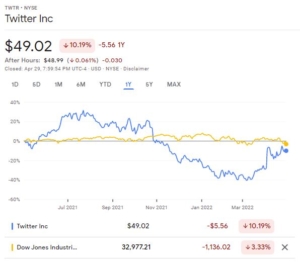
Twitter (NYSE:TWTR) stock price, 1-year chart (source: Google Finance)
Here’s Twitter’s financial performance for fiscal year 2021:
Net income:
December 2021 – $181.69M
September 2021 – (536.76M)
June 2021 – $65.65M
March 2021 – $68.0M
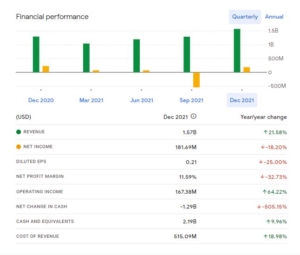
Twitter’s financial performance, 2021 (source: Google Finance)
Note the return on equity:
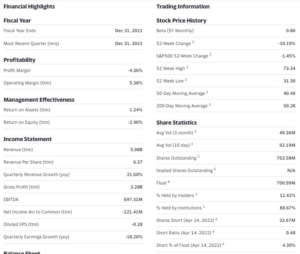
Twitter’s financial statistics (source: Yahoo Finance)
By comparison, Facebook/Meta’s ROE is 31.10%.
Aljazeera reported an increase in active daily users over the last quarter:
Twitter reported an average of 229 million daily active users in the quarter, which was about 14 million more than a revised 214.7 million daily users in the previous quarter.
I can’t find the number I saw from late 2021 which said Twitter had 206 million active daily users. The uptick seems off considering the amount of work Twitter has done to remove bot accounts. Personally, I would guesstimate 5-10% of active daily user accounts are inauthentic, of which a third to half may represent attrition or float as bots are weeded out.
Which means Musk has offered an insane amount between ~$216 to ~$229 per authentic active daily user on a userbase which could plummet simply because he, Musk, bought it.
Or worse, from an advertising perspective: accounts could remain but degrade engagement to less than daily activity, making advertising space much less valuable, less functional.
Granted, his right-wing fanboi base could surge if many of their suspended or ejected accounts are allowed to return, but advertisers may balk if the volume of hate speech returns with them.
Very genius. Much capitalist. So Musk.
~ ~ ~
Twitter employees have expressed concern about Musk’s acquisition — well-earned concern considering Musk attacked a key BIPOC employee via tweets about Twitter’s handling of abusive or sensitive content in spite of a non-disparagement clause. What incredible blindness if not outright lack of sensitivity.
You’d think a South African by birth would be a bit more sensitive to the issue of race on top of the non-disparagement clause, but Twitter employees already had plenty to be concerned about given the problem of overt racism at Tesla documented in a successful lawsuit by a former contract employee , a class action lawsuit by employees, and a lawsuit by the state of California. Racist graffiti and epithets aren’t free speech in the workplace — they’re endorsements of racism in the corporate culture.
Musk may want to fire a lot of Twitter employees to cut costs and clean house, but losing the faith and respect of Twitter’s workforce before the ink has dried won’t serve the end he desires and needs, a seamless transition which doesn’t disrupt the platform so that advertisers will continue to buy ad space.
In spite of his fanbois’ approbation including tech and econ journalists, Musk’s musings about new monetizing efforts demonstrated a gross lack of understanding about the platform.
Like charging users to quote tweet or retweet content.
Way to kill his newly-acquired platform right out of the gate. This is such a stupid idea that one has to wonder if he understands the internet at all.
It doesn’t help Musk’s image with a substantive portion of Twitter users that while he benefits from government aid and contracts, his businesses don’t necessarily result in revenues.
Rumor has it Musk has also considered monetizing tweets based on popularity, paying users for most viral tweets as if this couldn’t be gamed.
(I know, this looks like jibberish to the olds but imagine Musk paying out a buck for every Like that kind of quote tweet generated.)
Will Musk expect to pay next to nothing in taxes if he ever makes Twitter profitable, while steadily undermining democracy with his craptastic notion of free speech?
Wouldn’t he be better off building a platform from scratch with less than a billion bucks investment given his access to and approval of so many techbros, thereby building a low-tax “free speech” vehicle on his own terms without Twitter’s baggage?
Especially since he has 84 million followers, an audience of which many are committed fanbois — can’t he start something and get them on board as his first users?
And if he can’t do that, why not?
~ ~ ~
Consensus among punditry and opiners is that Musk will drop a billion in penalty fees for exiting the deal and walk away.
But is there a reason Musk has gotten this far down the road with this acquisition project? Is there something else besides free speech motivating Musk to hang on?
This account suggests in this Twitter thread that Tesla’s challenges with current U.S. dealership laws are why Musk wants Twitter.
In other words, instead of lobbying in all states where manufacturers can’t sell their cars directly to the public without a third-party dealer, Musk would use the clout of his Twitter platform to press on the public to campaign for a change benefiting Tesla.
Timing is critical since pressure to exit fossil fuels has increased due to Russia’s invasion of Ukraine, and the other major automakers are gearing up their plans for increased electric vehicle sales. Musk would surely like to get ahead of the competition more so than Tesla already is with its 2-3 million total EV sales to date.
But is this lobbying alternative approach really cost effective at $44 billion?
Or is he planning to use Twitter as his own personal advertising platform for Tesla and other products like Powerwall? Musk is now looking at promising some of his Tesla stock in lieu of his own cash to obtain financing; is this a gamble that Twitter will promote Tesla’s value enough that he won’t feel the loss of the Tesla stock offered to banks?
Or is Musk planning to sell another product — like users’ data — and he’s figured he’ll make enough from that product to offset his Tesla stock swapped for financing?
Whatever the case, I’ll be gone if he sells users’ data. I’ll leave a worthless hollow social media shell behind.
Free speech, the kind to which no advertiser wants to sell.

